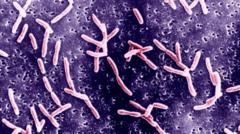In the heart of Pune, India, a school teacher experienced a parent’s worst nightmare when her six-year-old son showed signs of Guillain-Barre Syndrome (GBS), a rare neurological disorder. Initially perceived as frustration over homework, the child’s struggle to hold a pencil quickly escalated into a life-threatening situation; within days, he was in intensive care, unable to move and requiring ventilator support. He is among around 160 GBS cases reported since January, with officials confirming five suspected deaths.
GBS manifests with tingling sensations and muscle weakness, typically escalating over two to four weeks. The reported mortality rate varies between 3% and 13%, influenced by healthcare access and patient condition. The current outbreak in Pune is being traced back to the pathogen Campylobacter jejuni, frequently associated with foodborne illnesses and a known catalyst for GBS outbreaks worldwide.
Historically, GBS has been recognized in India, with studies showing over a third of patients linked to Campylobacter between 2014 and 2019. Recent outbreaks with similar links have occurred globally, notably in Peru, which also saw governmental health responses. Most healthcare ailments associated with GBS in developed countries relate to respiratory infections, highlighting the significance of environmental factors in developing nations.
A specific strain of Campylobacter—possessing a molecular structure resembling human nerve cells—occurs sporadically, leading to GBS under rare circumstances. Experts suggest the occurrence of a particular Campylobacter strain in Pune is likely contributing to the surge in cases.
As there's no definitive cure for GBS, medical responses are limited to therapeutic interventions, including "plasma exchange" and intravenous immunoglobulin therapy. Diagnosing GBS poses challenges as it mimics symptoms of other conditions like polio. Misdiagnosis exacerbates the consequences, especially in rural regions where healthcare resources may be limited.
The World Health Organization (WHO) is now involved in monitoring the situation alongside local health officials, proactively testing over 160 water samples and endorsing hygiene measures. Residents are being urged to drink boiled water, consume fresh foods, and refrain from eating undercooked poultry.
As the region copes with this rising health crisis, the focus remains on understanding the outbreak's root causes, whether through environmental contamination or food safety issues. Despite health advisories urging calm, the looming specter of GBS leaves many in Pune apprehensive as they seek clarity amid uncertainty.


















